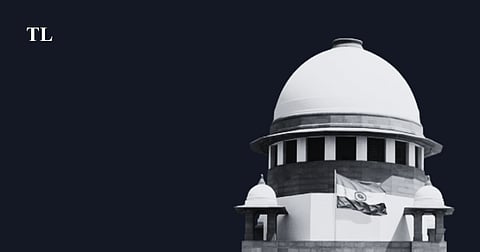

Inamur Rahman had been granted interim stay on arrest by the Supreme Court last month. He had been charged under several provisions of the Indian Penal Code for an allegedly communal book being present in the library of the college of which he was principal.
—-
THE Chief Justice of India ('CJI') on Monday chided the Madhya Pradesh government for its proposed challenge to the stay of arrest granted to a former college principal in Indore who is facing a first information report ('FIR') against him for a book allegedly promoting religious animosity being available in the college library.
"Are you serious? You are harassing a college principal for a book found in the college library which has communal overtones?" exclaimed CJI Dr. D.Y. Chandrachud.
On December 17 last year, the Supreme Court stayed the arrest of Inamur Rahman and directed the matter to be listed on January 16.
When the advocate for the petitioner informed the bench, which also comprised Justices P.S. Narasimha and J.B. Pardiwala, that Rahman had already been granted anticipatory bail in the matter, CJI Dr. Chandrachud proposed to dispose of the case on the grounds that nothing survived in it. However, the advocate appearing for the Madhya Pradesh government urged the court to clarify that its order would not come in the way of its challenge to the anticipatory bail.
This irked the CJI, who chided the government for harassing the college principal.
Rahman was booked by police for promoting enmity between religious communities for the book, 'Collective Violence and Criminal Justice System' authored by Dr. Farhat Khan, which allegedly contained objectionable remarks against Hindus and the Rashtriya Swayamsewak Sangh ('RSS'), and showed the Union Government and the armed forces in a bad light.
Besides, the police booked the book's author Dr. Khan, college professor Dr. Mirza Mojiz, and the book's publisher Amar Law Publication. The FIR contains charges under Sections 153A (promoting enmity between different groups on grounds of religion, race, place of birth, residence, language, etc., and doing acts prejudicial to maintenance of harmony), 153B (imputations, assertions prejudicial to national integration), 295A (deliberate and malicious acts, intended to outrage religious feelings of any class by insulting its religion or religious beliefs), 500 (punishment for defamation), 504 (intentional insult with intent to provoke breach of the peace), 505 (statements conducing to public mischief), 505(2) (statements creating or promoting enmity, hatred or ill-will between classes), read with Section 34 (acts done by several persons in furtherance of common intention) of the Indian Penal Code.
Rahman argued that the book was purchased in 2014 by the college, that is, much before he took charge as principal, and that he had no knowledge of the existence of the book in the library.
"The entire attempt is to politicise the incident with the help of police officers and tarnish the reputation of the petitioner who is in no way involved in the publication of the possession or has remotely connected with the publication or marketing of the said book," Rahman asserted.
On December 15, a single-judge bench of the Madya Pradesh High Court refused to grant any interim protection to Rahman, observing that the allegations against him were serious in nature. Rahman challenged this order before the Supreme Court.
Taking up the matter for hearing out of turn, CJI Dr. Chandrachud on December 17 remarked that the petitioner "has made out more than an abundant case for a grant of relief."
Rahman had been allegedly forced to resign as the principal of New Government Law College on December 3 after the controversy over the book erupted.